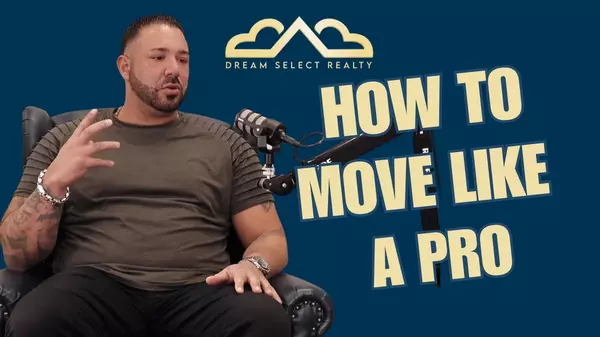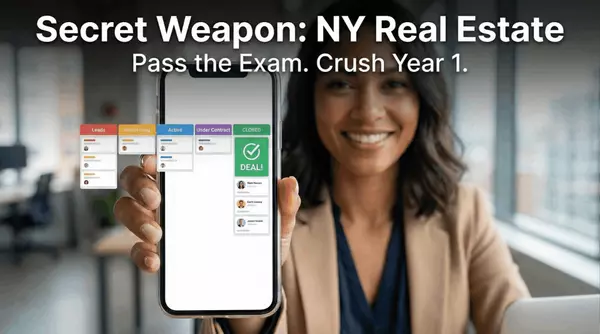Your Guide to Dominating the Long Island Real Estate Market: A Dream Team Marketing Blueprint

Hey Dream Team!
Welcome to your weekly dose of inspiration and strategy, designed to help you become the most sought-after real estate agent in Nassau and Suffolk County. In the competitive landscape of Long Island real estate, where every town from Great Neck to Montauk has its own unique charm and challenges, simply being a good agent isn’t enough. You need to be a known agent. A trusted agent. A go-to agent.
That’s where marketing and self-promotion come in. It’s not about being boastful or salesy; it’s about building a personal brand that reflects your expertise, your passion, and your commitment to serving the Long Island community. It’s about creating a magnetic presence that attracts clients to you, so you can spend less time chasing leads and more time doing what you do best: helping people find their dream homes.
This comprehensive guide is your blueprint for building a powerful personal brand and marketing yourself effectively across Nassau and Suffolk County. We’ll cover everything from defining your unique value proposition to mastering digital marketing, building a referral network, and becoming a true community leader. By the end of this post, you’ll have a clear roadmap for taking your business to the next level and solidifying your position as a top agent on Long Island.
So grab your coffee, get comfortable, and let’s dive into the strategies that will help you dominate the Long Island real estate market. Your journey to becoming a household name starts now.
Section 1: Building Your Personal Brand: The Foundation of Your Success
Before you can effectively market yourself, you need to know what you’re marketing. Your personal brand is the foundation of all your marketing efforts. It’s what makes you unique and memorable in a sea of other real estate agents. It’s your story, your values, and your promise to your clients.
Define Your Unique Value Proposition (UVP)
Your UVP is a clear statement that describes the benefit you offer, how you do it, and who you do it for. It’s what makes you different from your competitors. To define your UVP, ask yourself the following questions:
-
What are your strengths? Are you a great negotiator? A marketing whiz? A neighborhood expert? Do you have a background in finance or construction that gives you a unique perspective?
-
Who is your ideal client? Are you passionate about helping first-time homebuyers? Do you specialize in luxury properties? Do you enjoy working with seniors who are downsizing? The more specific you can be, the better.
-
What is your unique approach? Do you use cutting-edge technology to market your listings? Do you provide a high-touch, concierge-level of service? Do you have a proven system for helping your clients win in multiple-offer situations?
Once you’ve answered these questions, you can craft a UVP that is both authentic and compelling. For example, a UVP for an agent specializing in helping families move to the suburbs of Nassau County might be:
“I help growing families find their forever homes in the top-rated school districts of Nassau County. With my deep knowledge of the local market and my proven negotiation strategies, I make the transition from city to suburb seamless and stress-free.”
Create a Professional Brand Identity
Your brand identity is the visual representation of your personal brand. It includes the brokerage company logo, and color palette, fonts, and the overall look and feel of your marketing materials. Your brand identity should be professional, consistent, and reflective of your UVP.
-
Professional Headshot: Invest in a high-quality, professional headshot. This is often the first impression potential clients will have of you, so make it a good one. Your headshot should be warm, approachable, and professional.
-
Logo and Branding: Work with a graphic designer to create a simple, elegant and consistent marketing materials, from your business cards to your website to your social media profiles.
-
Tagline: A catchy tagline can help people remember you and what you do. Your tagline should be short, memorable, and aligned with your UVP. For example: “Your Key to the Gold Coast” or “Making Your Hamptons Dream a Reality.”
Live Your Brand
Your personal brand is not just about what you say; it’s about what you do. Every interaction you have with a client, a colleague, or a community member is an opportunity to reinforce your brand. Be professional, be responsive, and always go the extra mile. When you consistently deliver on your brand promise, you’ll build a reputation as a trusted and respected agent that people will be eager to work with and recommend to others.
Section 2: Mastering Digital Marketing: Your 24/7 Lead Generation Machine
In today’s digital world, a strong online presence is non-negotiable. Your website, your social media profiles, and your online advertising are your 24/7 lead generation machine. They are working for you even when you’re not. Here’s how to master digital marketing and make it work for you.
Your Personal Agent Website:
Your website is the hub of your online presence. It’s where potential clients will go to learn more about you, to search for properties, and to decide if you’re the right agent for them. Your website should be professional, user-friendly, optimized for search engines and compliant with the branding and vision of the brokerage you are licensed under.
-
Professional Design: Your website should be visually appealing and easy to navigate. It should be mobile-friendly, as more and more people are searching for homes on their phones and tablets.
-
Valuable Content: Your website should be more than just a home search tool. It should be a resource for buyers and sellers on Long Island. Create blog posts, videos, and guides about the local market, the home buying and selling process, and the Long Island lifestyle. This will position you as a local expert and help you attract more traffic to your site.
-
Lead Capture: Your website should have clear calls-to-action and easy-to-use lead capture forms. Offer a free home valuation, a buyer’s guide, or a market report in exchange for an email address.
Social Media: Build a Community, Not Just a Following
Social media is a powerful tool for building relationships and staying top-of-mind with your sphere of influence. But it’s not just about posting your listings. It’s about building a community and providing value to your followers.
-
Choose Your Platforms: You don’t have to be on every social media platform. Choose the one or two platforms where your ideal clients are most active. For most real estate agents, Facebook and Instagram are the best places to start.
-
Content Strategy: Create a content strategy that is a mix of real estate-related content, local content, and personal content. Share your listings, but also share information about local events, restaurants, and attractions. And don’t be afraid to show a little bit of your personality. People want to work with people they know, like, and trust.
-
Engage with Your Audience: Social media is a two-way conversation. Don’t just post and run. Respond to comments, answer questions, and engage with other people’s content. The more you engage, the more visible you’ll be.
-
Facebook and Instagram Ads: Social media advertising can be a very effective way to reach a targeted audience. You can create ads that target people based on their location, their interests, and their online behavior. This is a great way to generate leads and to drive traffic to your website.
Email Marketing: Your Most Powerful Conversion Tool
Email marketing is one of the most effective ways to nurture your leads and to convert them into clients. It’s a direct line of communication with people who have already expressed an interest in what you have to offer.
- Build Your List: Your email list is one of your most valuable assets. You can build your list by offering a free resource on your website, by collecting email addresses at your open houses, and by asking your social media followers to subscribe.
- Provide Value: Your email newsletters should be filled with valuable information that your subscribers will appreciate. Share market updates, home maintenance tips, and information about local events. You can also feature your new listings and your recent sales.
- Segment Your List: Not all of your subscribers are the same. Some are buyers, some are sellers, and some are just homeowners who are interested in the market. Segment your list so you can send targeted messages to each group. This will make your emails more relevant and more effective.
- Automated Drip Campaigns: An automated drip campaign is a series of emails that are sent out automatically over a period of time. This is a great way to nurture your new leads and to stay in touch with your past clients. You can create a drip campaign for new leads, for past clients, and for people who have expressed an interest in a particular neighborhood.
Section 3: Building a Referral Network: Your Army of Advocates
Referrals are the lifeblood of any successful real estate business. A referral from a trusted friend, family member, or colleague is one of the most powerful forms of marketing there is. But a strong referral network doesn’t just happen by accident. It’s the result of building strong relationships and providing exceptional service. Here’s how to build an army of advocates who will be eager to send business your way.
Your Sphere of Influence (SOI)
Your SOI is everyone you know, from your closest friends and family to your past clients to the people you see at the gym. These are the people who already know, like, and trust you. They are your biggest fans and your most likely source of referrals. But you have to stay in touch with them and remind them that you’re in the real estate business.
- Your Database: The first step is to create a database, of everyone in your SOI. This should include their name, their contact information, and any personal notes that will help you remember them. Your CRM, provided to you by yiur brokerage, is the perfect place to store this information.
- Systematic Communication: Create a system for staying in touch with your SOI. This could include a monthly email newsletter, a quarterly phone call, and a personal note on their birthday or home anniversary. The key is to be consistent and to provide value in every interaction.
- The 8x8 and 33 Touch Systems: These are proven systems for staying in touch with your SOI. The 8x8 system involves touching your new contacts eight times in the first eight weeks. The 33 Touch system involves touching your contacts 33 times throughout the year. These systems may seem like a lot of work, but they are incredibly effective at keeping you top-of-mind.
Strategic Partnerships
In addition to your SOI, you should also be building relationships with other professionals who serve homeowners. These strategic partners can be a great source of referrals, and you can also refer business to them. It’s a win-win.
-
Identify Potential Partners: Think about all the other professionals who are involved in a real estate transaction. This includes mortgage brokers, real estate attorneys, home inspectors, and insurance agents. You should also think about other professionals who serve homeowners, such as contractors, landscapers, and interior designers.
-
Build a Two-Way Street: When you build a relationship with a strategic partner, it should be a two-way street. You should be just as eager to send business to them as they are to send business to you. This is how you build a strong and lasting partnership.
-
Networking Events: Attend local networking events, such as our annual DSR Networking for Leads Event in October, to meet other professionals in your area. The Chamber of Commerce, the local BNI chapter, and other business groups are great places to start also. Don’t just go to these events to hand out your business card. Go to build genuine relationships.
Past Clients: Your Raving Fans
Your past clients are one of your most valuable assets. If you’ve provided them with exceptional service, they will be your raving fans. They will be eager to tell their friends and family about their great experience with you. But you have to stay in touch with them and continue to provide value long after the transaction is over.
- Client Appreciation Events: Host a client appreciation event once or twice a year. This could be a summer barbecue, a holiday party, or a movie night. This is a great way to thank your past clients for their business and to stay in touch with them in a fun and relaxed setting.
- Home Anniversary Gifts: Send a small gift to your past clients on the anniversary of their home purchase. This could be a gift card to a local restaurant, a bottle of wine, or a small plant. It’s a thoughtful gesture that will remind them of you and your great service.
- Ask for Reviews and Testimonials: Don’t be afraid to ask your past clients for reviews and testimonials. You can post these on your website, your social media profiles, and your other marketing materials. A glowing review from a happy client is one of the most powerful marketing tools you have.
Section 4: Becoming a Community Leader: The Heart of Your Business
Real estate is a local business. The more you’re involved in your community, the more successful you’ll be. When you’re a visible and active member of your community, people will get to know you, like you, and trust you. They’ll see you as more than just a real estate agent; they’ll see you as a neighbor and a friend. Here’s how to become a true community leader in Nassau and Suffolk County.
Get Involved
There are countless ways to get involved in your community. The key is to find something you’re passionate about and to be consistent in your involvement. Don’t just join a bunch of committees to put it on your resume. Find a cause you care about and give it your time and your energy.
- Local Charities and Non-Profits: Volunteer for a local charity or non-profit organization. This is a great way to give back to your community and to meet other people who are passionate about the same things you are.
- School and Youth Sports: If you have children, get involved in their school or their sports teams. This is a great way to meet other parents and to become a trusted resource in your community.
- Local Events: Sponsor a local event, like a summer concert series, a fall festival, or a holiday parade. This is a great way to get your name out there and to show your support for the community.
Be a Local Expert
As a real estate agent, you should be the go-to expert for everything related to your community. You should know the best restaurants, the best parks, and the best schools. You should be able to tell your clients about upcoming events and new developments. The more you know about your community, the more valuable you’ll be to your clients.
- Create Community-Focused Content: Create blog posts, videos, and social media content about your community. You could do a video tour of a local park, a blog post about the best restaurants in town, or a social media series about local heroes. This is a great way to provide value to your followers and to position yourself as a local expert.
- Host Community Events: Host a community event, like a shredding event, a food drive, or a pumpkin-painting contest. This is a great way to bring people together and to give back to your community.
- Partner with Local Businesses: We’ve already talked about partnering with local businesses for your open houses, but you can also partner with them for other community events. You could co-host a seminar for first-time homebuyers with a local mortgage broker, or you could do a joint promotion with a local restaurant.
Build Relationships with Local Media
Building relationships with local media can be a great way to get free publicity and to position yourself as a real estate expert. Local newspapers, magazines, and TV stations are always looking for stories about the local real estate market. When you have a newsworthy story, don’t be afraid to reach out to them.
-
Be a Resource: Make yourself available to local reporters as a resource for their stories. If they’re writing an article about the local real estate market, they may need a quote from a local expert. Be that expert.
-
Share Your Expertise: Write a column for a local newspaper or magazine. This is a great way to share your expertise and to reach a wide audience.
-
Press Releases: When you have a newsworthy event, like a record-breaking sale or a major community event, send out a press release to the local media. This is a great way to get free publicity and to build your brand.
By becoming a true community leader, you’ll not only be growing your business, but you’ll also be making a positive impact on the community you serve. And that’s what being a Dream Team agent is all about.
Conclusion: Your Journey to the Top
Congratulations, Dream Team! You’ve made it through the blueprint for dominating the Long Island real estate market. We’ve covered a lot of ground, from building your personal brand to mastering digital marketing, building a referral network, and becoming a community leader. It may seem like a lot, but remember that you don’t have to do it all at once.
Start with one or two strategies that resonate with you and that you can implement right away. The key is to be consistent and to be patient. Building a strong personal brand and a successful real estate business takes time. But with the right strategies and a lot of hard work, you can achieve your goals and become the go-to agent in your community.
Remember, you’re not just selling houses; you’re helping people achieve their dreams. You’re a trusted advisor, a neighborhood expert, and a community leader. You’re a member of the Dream Team. Now go out there and make your mark on the Long Island real estate market. We’re here to support you every step of the way.
“Your success is our dream.”
Section 5: Long Island-Specific Marketing Strategies: Know Your Territory
Nassau and Suffolk County present unique opportunities and challenges that require specialized marketing approaches. Understanding the distinct characteristics of each area, from the Gold Coast mansions of Great Neck to the beach communities of the Hamptons, is crucial for your success as a Dream Team agent.
Understanding the Nassau County Market
Nassau County is home to some of the most affluent communities on Long Island, with a rich history and diverse housing stock. From the luxury estates of Old Westbury to the charming villages of Garden City and Manhasset, each area has its own personality and target demographic.
The Gold Coast communities, including Great Neck, Roslyn, and Manhasset, attract high-net-worth individuals who value privacy, prestige, and proximity to Manhattan. When marketing in these areas, emphasize luxury amenities, architectural significance, and the exclusivity of the location. Your marketing materials should reflect the sophistication of your clientele, with high-end photography, premium print materials, and exclusive events. Our office assistants at Dream Select Realty can help agents with this.
The mid-Nassau communities like Levittown, Hicksville, and Plainview represent the heart of suburban Long Island. These areas attract families looking for good schools, safe neighborhoods, and value for their money. Your marketing here should focus on family-friendly features, school district rankings, and community amenities. Highlight local parks, youth sports leagues, and family events.
Mastering the Suffolk County Landscape
Suffolk County offers an even more diverse range of markets, from the working-class communities of Central Islip and Brentwood to the exclusive enclaves of the Hamptons. Understanding these distinctions is crucial for effective marketing.
The Hamptons market operates on a completely different level from the rest of Long Island. Here, you're dealing with second homes, investment properties, and clients who may be based in Manhattan, Los Angeles, or even internationally. Your marketing needs to reflect this global perspective. Consider advertising in luxury lifestyle magazines, partnering with high-end concierge services, and maintaining relationships with Manhattan-based agents who may have clients looking for Hamptons properties.
The North Shore communities like Huntington, Cold Spring Harbor, and Northport offer a blend of historic charm and modern amenities. These areas attract professionals who want a sophisticated suburban lifestyle with easy access to both Manhattan and the beaches. Your marketing should emphasize the best of both worlds: the cultural amenities and dining scene combined with excellent schools and natural beauty.
Seasonal Marketing Considerations
Long Island's seasonal nature requires you to adjust your marketing strategies throughout the year. The summer months bring an influx of visitors to the beach communities, creating opportunities for vacation rental marketing and second-home sales. Your social media content during this time should showcase the Long Island lifestyle: beach days, local festivals, and outdoor dining.
Fall is traditionally the strongest season for family home sales, as parents want to be settled before the school year begins. This is the time to ramp up your marketing to families, highlighting school districts, youth sports registration, and community events.
Winter marketing requires creativity, as the beaches are less appealing and outdoor activities are limited. Focus on cozy interior features, proximity to winter activities like ice skating and skiing, and the charm of Long Island's holiday celebrations.
Spring brings renewal and the start of the busy selling season. This is the perfect time to launch new marketing campaigns, refresh your website content, and plan your community involvement for the year ahead.
Leveraging Long Island's Unique Assets
Long Island offers assets that you won't find anywhere else in the country. The combination of beaches, vineyards, historic sites, and proximity to Manhattan creates a unique value proposition that you should weave into all your marketing efforts.
The Long Island Wine Trail has become a major attraction, drawing visitors from around the world. If you're working in the North Fork area, partner with local wineries for events and cross-promotion. Even if you're not directly in wine country, you can use the region's growing reputation as a destination to attract buyers who want to be part of this exciting development.
The beaches are obviously a major draw, but don't just focus on the obvious ones. Long Island has dozens of beautiful beaches, each with its own character. From the family-friendly beaches of Jones Beach to the exclusive clubs of the Hamptons, make sure you know them all and can speak knowledgeably about their unique features.
The rich history of Long Island, from the Gold Coast mansions to the whaling villages of the East End, provides endless content for your marketing efforts. Create blog posts about historic homes, share stories about famous former residents, and position yourself as an expert on the area's heritage.
Building Your Local Network
Success on Long Island requires building relationships with the right people in each community. This goes beyond just other real estate agents to include local business owners, community leaders, and influencers.
In the Hamptons, this might mean building relationships with high-end event planners, luxury car dealers, and private club managers. In Nassau County, it could be school board members, youth sports coaches, and local restaurant owners. The key is to understand who influences decisions in each community and to build genuine relationships with these people.
Don't forget about the seasonal nature of many Long Island communities. In the Hamptons, for example, many of the key influencers may only be present during the summer months. Plan your networking activities accordingly, and make sure you're visible during the times when your target market is most active.
Technology and Innovation in Long Island Real Estate
Long Island buyers and sellers are increasingly sophisticated and expect their agents to use the latest technology. This is especially true in the higher-end markets, where clients may be accustomed to cutting-edge technology in their professional lives.
Virtual reality tours are becoming increasingly popular, especially for out-of-area buyers who may be purchasing a Hamptons home sight unseen. Drone photography is essential for showcasing waterfront properties and large estates. Social media live streaming can be particularly effective for open houses in desirable locations.
Consider investing in technology that sets you apart from your competition. This might include 3D floor plans, virtual staging, or even augmented reality apps that allow buyers to visualize renovations. The key is to choose technology that adds real value for your clients, not just technology for its own sake.
Section 6: Content Marketing and Thought Leadership: Becoming the Go-To Expert
In today's information-driven world, buyers and sellers don't just want an agent who can facilitate a transaction; they want an expert who can guide them through the complex world of real estate. By positioning yourself as a thought leader through strategic content marketing, you can attract clients who are already convinced of your expertise before they even meet you.
The Power of Educational Content
Educational content is the foundation of effective real estate marketing. When you consistently provide valuable information to your audience, you build trust and establish yourself as an authority in your field. This is particularly important on Long Island, where the real estate market can be complex and intimidating for newcomers.
Start by identifying the questions your clients ask most frequently. Are they confused about the co-op approval process in Nassau County? Do they need help understanding flood zones in coastal areas? Are they unsure about the differences between incorporated villages and hamlets? These common questions are the perfect starting points for your content marketing efforts.
Create comprehensive guides that address these topics in detail. A guide to "Understanding Long Island School Districts" could be incredibly valuable to families relocating to the area. A detailed explanation of "Waterfront Property Ownership on Long Island" could attract high-end buyers interested in coastal homes. These guides serve multiple purposes: they provide immediate value to your audience, they demonstrate your expertise, and they can be used as lead magnets to capture contact information.
Video content is particularly effective for real estate marketing. Consider creating a weekly video series where you tour different Long Island neighborhoods, highlighting their unique characteristics and amenities. This type of content is highly shareable and helps potential clients get to know you personally before they ever meet you in person.
Market Analysis and Commentary
Positioning yourself as a market expert requires you to stay on top of trends and provide insightful analysis of what's happening in the Long Island real estate market. This goes beyond simply reporting statistics; it involves interpreting data and explaining what it means for buyers and sellers.
Create monthly market reports for different areas of Long Island. Don't just include the basic statistics like median sales price and days on market. Provide context and analysis. What factors are driving price increases in certain areas? How are new developments affecting inventory levels? What impact are interest rate changes having on buyer behavior?
Share your insights on broader economic trends and how they might affect the Long Island market. If new companies are moving to the area, discuss how this might impact housing demand. If there are changes to the SALT deduction or other tax policies, explain how this might affect high-end markets like the Hamptons.
Your market commentary should be accessible to the average consumer while still demonstrating your professional expertise. Avoid industry jargon and explain complex concepts in simple terms. Remember, your goal is to educate your audience, not to impress them with your vocabulary.
Storytelling and Case Studies
Real estate is ultimately about people and their stories. Some of your most powerful content will come from sharing the stories of your clients and their real estate journeys. Obviously, you need to respect client confidentiality, but with permission, you can share compelling stories that illustrate your expertise and the value you provide.
A case study about helping a family find their dream home in a competitive market can be much more compelling than a simple testimonial. Walk your audience through the challenges you faced, the strategies you employed, and the successful outcome you achieved. This type of content demonstrates your problem-solving abilities and gives potential clients confidence in your skills.
Don't forget to share your own story as well. How did you get into real estate? What drew you to the Long Island market? What do you love most about helping people buy and sell homes? Personal stories help potential clients connect with you on an emotional level, which is crucial for building trust and rapport.
Leveraging Local Events and Trends
Long Island is constantly evolving, with new restaurants opening, new developments being announced, and new events being planned. Staying on top of these changes and incorporating them into your content marketing efforts can help you stay relevant and top-of-mind with your audience.
When a new restaurant opens in your area, visit it and share your experience on social media. When a new development is announced, provide analysis of what it might mean for the surrounding area. When local events are happening, attend them and share your experiences with your audience.
This type of content serves multiple purposes. It positions you as someone who is actively engaged in the community, it provides valuable information to your audience, and it gives you a steady stream of content ideas. It also helps you build relationships with local business owners and event organizers, which can lead to referral opportunities.
Building Your Content Distribution Strategy
Creating great content is only half the battle; you also need to make sure it reaches your target audience. This requires a strategic approach to content distribution across multiple channels.
Your website should be the hub of your content marketing efforts. This is where you publish your comprehensive guides, market reports, and case studies. Make sure your website is optimized for search engines so that people searching for real estate information in your area can find your content.
Social media platforms are perfect for sharing bite-sized pieces of your content and driving traffic back to your website. A comprehensive neighborhood guide might become a series of Instagram posts highlighting different aspects of the area. A market report might be summarized in a LinkedIn article with a link to the full report on your website.
Email marketing allows you to deliver your content directly to people who have expressed interest in what you have to offer. Create a monthly newsletter that includes your latest market insights, new content, and upcoming events. Segment your email list so you can send targeted content to different groups of subscribers.
Don't overlook traditional media opportunities. Local newspapers and magazines are often looking for expert commentary on real estate trends. Radio stations may need guests for talk shows. These opportunities can help you reach a broader audience and establish your credibility as a local expert.
Measuring Your Content Marketing Success
Like any marketing effort, your content marketing should be measurable. Set specific goals for your content marketing efforts and track your progress toward achieving them. Are you trying to increase website traffic? Generate more leads? Build your email list? Establish yourself as a thought leader?
Use analytics tools to track how your content is performing. Which blog posts are getting the most traffic? Which social media posts are generating the most engagement? Which pieces of content are driving the most leads? Use this data to refine your content strategy and focus on creating more of what works.
Remember that content marketing is a long-term strategy. You may not see immediate results, but over time, consistent, high-quality content will help you build a strong personal brand and attract more clients to your business.
Section 7: Traditional Marketing Methods That Still Work: The Power of Personal Touch
While digital marketing dominates today's landscape, traditional marketing methods remain incredibly effective in real estate, especially in a relationship-driven market like Long Island. The key is knowing when and how to use these methods to complement your digital efforts and create a comprehensive marketing strategy that reaches clients through multiple touchpoints.
Direct Mail: Making a Comeback in the Digital Age
Direct mail has experienced a renaissance in recent years, partly because so much marketing has moved online that physical mail stands out more than ever. When done correctly, direct mail can be an incredibly effective way to reach potential clients in specific geographic areas.
The key to successful direct mail is targeting and personalization. Rather than sending generic postcards to entire zip codes, focus on specific neighborhoods where you want to build your presence. If you've recently sold a home in a particular area, send a "Just Sold" postcard to the surrounding homes. This serves multiple purposes: it announces your success, it provides market information to homeowners who might be considering selling, and it establishes you as the active agent in that neighborhood.
Seasonal direct mail campaigns can be particularly effective on Long Island. A spring market preview sent to homeowners in February can generate seller leads just as the market is heating up. A holiday card in December keeps you top-of-mind during a traditionally slow period and shows your personal touch.
Consider creating a monthly newsletter that you mail to your target neighborhoods. This newsletter should include market updates, local business spotlights, community event announcements, and helpful tips for homeowners. The key is to provide value in every piece you send, not just promote your services.
Print Advertising: Strategic Placement for Maximum Impact
While print advertising has declined in many industries, it still has a place in real estate marketing, particularly for luxury properties and in community-focused publications. The key is choosing the right publications and creating compelling ads that stand out.
Local newspapers and magazines often have dedicated real estate sections that are well-read by potential clients. These publications also tend to have loyal readerships who trust the content and advertising. A well-placed ad in a local publication can be more effective than a much larger ad in a regional publication where you're competing with dozens of other agents.
Consider sponsoring a regular column or section in a local publication. This positions you as an expert and gives you regular exposure to the publication's readership. You might sponsor a "Home of the Week" feature or write a monthly column about market trends.
High-end publications are essential if you're working in the luxury market. Publications like Hamptons Magazine, Gold Coast Magazine, and Dan's Papers reach affluent readers who are potential clients for luxury properties. The cost per impression may be higher, but the quality of the audience makes it worthwhile.
Networking Events: Building Relationships Face-to-Face
In an increasingly digital world, face-to-face networking has become more valuable than ever. People crave authentic human connections, and networking events provide the perfect opportunity to build the relationships that drive referral business.
Chamber of Commerce events are a staple of business networking on Long Island. Most communities have active chambers that host regular networking events, educational seminars, and community celebrations. Regular attendance at these events helps you build relationships with other business owners who can become referral sources.
Industry-specific networking groups can be particularly valuable, such as the annual DSR NFL(Networking For Leads) Event. This event allows you to connect with other agents, lenders, attorneys, and service providers. These relationships can lead to referrals and collaborative opportunities.
Consider hosting your own networking events. A quarterly breakfast for local business owners, a monthly happy hour for young professionals, or an annual charity fundraiser can position you as a community leader while building your network. The key is to focus on providing value to attendees, not just promoting your business.
Community Sponsorships: Investing in Your Market
Sponsoring community events and organizations is one of the most effective ways to build brand awareness and demonstrate your commitment to the community. Long Island has countless opportunities for sponsorship, from youth sports teams to charity events to local festivals.
When choosing sponsorship opportunities, look for events and organizations that align with your target market. If you specialize in family homes, sponsoring a youth baseball team or school fundraiser makes sense. If you work in the luxury market, consider sponsoring a charity gala or cultural event.
The key to effective sponsorship is activation. Don't just write a check and put your name on a banner. Get involved in the event, volunteer your time, and use the opportunity to build relationships with other sponsors and attendees. This personal involvement makes your sponsorship much more valuable and memorable.
Consider creating your own community events. An annual scholarship program for local students, a charity drive for a local food bank, or a community cleanup day can generate positive publicity while demonstrating your values and commitment to the community.
Referral Programs: Systematizing Word-of-Mouth Marketing
Word-of-mouth marketing is the most powerful form of marketing in real estate, but it doesn't have to be left to chance. A well-designed referral program can systematize and amplify word-of-mouth marketing, turning your satisfied clients into active promoters of your business.
Create a formal referral program that rewards people for sending business your way. This could include past clients, other professionals, or anyone in your network. The rewards don't have to be monetary; they could include gift cards to local restaurants, tickets to local events, or donations to their favorite charity.
Make it easy for people to refer business to you. Provide them with business cards, flyers, and other materials they can share with potential clients. Create a simple online form where they can submit referral information. The easier you make it, the more likely they are to follow through.
Follow up on every referral, regardless of whether it results in business. Thank the person who made the referral, keep them updated on the progress, and let them know the outcome. This shows that you value their effort and makes them more likely to refer business to you in the future.
Personal Branding Through Traditional Channels
Traditional marketing channels offer unique opportunities for personal branding that can't be replicated online. A well-designed business card, a professional brochure, or a thoughtful gift can create a lasting impression that digital marketing simply can't match.
Invest in high-quality business cards that reflect your personal brand, while making sure to align with your brokerages brand and guidelines. Consider unique materials, finishes, or designs that make your card memorable. Your business card is often the first physical representation of your brand that potential clients will see, so make it count.
Create a professional brochure that tells your story and showcases your expertise. This doesn't have to be a generic real estate brochure; it should be uniquely yours. Include your background, your approach to real estate, testimonials from past clients, and information about your local market expertise.
Consider creating branded gifts that you can give to clients, referral sources, and networking contacts. These could include items like branded notebooks, coffee mugs, or even more substantial gifts like cutting boards or picture frames. The key is to choose items that are useful and that recipients will keep and use regularly.
Integrating Traditional and Digital Marketing
The most effective marketing strategies integrate traditional and digital methods to create a comprehensive approach that reaches clients through multiple touchpoints. Your traditional marketing should drive people to your digital platforms, and your digital marketing should reinforce your traditional efforts.
Include QR codes on your print materials that link to your website or social media profiles. Use your direct mail pieces to promote your email newsletter or social media content. Create hashtags for your events and encourage attendees to share their experiences on social media.
Track the effectiveness of your traditional marketing efforts just as you would your digital efforts. Use unique phone numbers or landing pages for different campaigns so you can measure their effectiveness. Ask new clients how they heard about you and track this information over time to understand which marketing methods are most effective for your business.
Remember that traditional marketing often works best for building brand awareness and credibility, while digital marketing is more effective for lead generation and nurturing. Use traditional methods to establish your presence in the community and build trust, then use digital methods to capture and convert leads into clients.
Recent Posts











